ISLAMABAD: The intersection of literature and politics was discussed on the first day of the Pakistan Mother Language Literature Festival during a session titled ‘Literature of Resistance’.
The panel discussion was moderated by journalist Mujahid Barelvi and featured Harris Khalique, Inam Sheikh, Abid Mir, Mazhar Nawaz, Kamran Achakzai and Mushtaq Mughool.
Each panelist discussed the topic with regards to a specific language, but due to a shortage of time the speakers were unable to delve into much detail.
At the start of the discussion, Mr Khalique, the panel expert on Urdu literature, spoke about the lack of attention given to indigenous and regional languages, referencing a Senate debate on whether to recognise another eight to 12 languages spoken in the country – he added that there are some 70 languages spoken in Pakistan – as national languages.
He said that the language problem is connected to power and is essentially a political one. In this, Urdu has acted as a unifier and a divider, he said.
Inam Shaikh, the panel expert on Sindhi literature, said: “The Sindhi mind is non-conformist.” Speeding through a history of Sindhi resistance in the subcontinent, he said people from Sindh have supported democracy since the creation of Pakistan.
Mr Shaikh also spoke about well-known Sindhi poets such as Shah Abdul Latif Bhittai and Shaikh Ayaz, and said there have been many great Sindhi poets since Shaikh Ayaz, but Shaikh Ayaz was not just a poet but an era.
“Sindh was the name of a civilisation, within which there are innumerable languages,” said Seraiki expert Mazhar Nawaz, adding that the more widely spoken of these include Sindhi, Seraiki and Punjabi, among others.
He said Seraiki has not been considered a separate language in Punjab, which is why it was natural for resistance to emerge in Seraiki literature, adding that its uniqueness as a language was even recognised by the British.
Mr Nawaz said there are examples of resistance in the kalaam of Sufi poet Khawaja Ghulam Farid.
The panel expert on Balochi literature, Mr Mir, said resistance was central to folk and modern literature, noting several figures from Balochi folk literature and history.
Mr Mughool, the panel expert on Hazaragi, spoke briefly on Hazaragi literature and recited a poem on the dangers and consequences of mixing religion and politics.
During the session, Mr Khalique also noted that Urdu speakers greatly outnumber native Urdu speakers, which is reflected in its literature.
He said there are many literary figures who wrote in Urdu even though it was not their mother tongue, and for many Urdu was not the native language four or five generations ago.
Published in Dawn, February 19th, 2017















































Dear visitor, the comments section is undergoing an overhaul and will return soon.